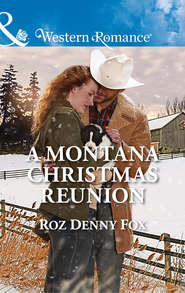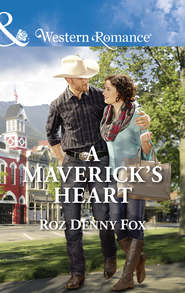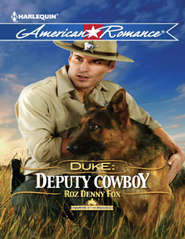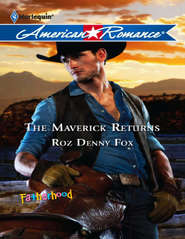По всем вопросам обращайтесь на: info@litportal.ru
(©) 2003-2024.
✖
More to Texas than Cowboys
Автор
Год написания книги
2018
Настройки чтения
Размер шрифта
Высота строк
Поля
“Okay, Shel, I think we have enough here so we won’t starve for a few days. All our talk about settling in has made me want to hurry and get there. Shall we go pay for our stuff?”
“Can I push the cart? Oh, and can I buy the book I showed you? It’s about a girl who grew up in Texas.” She latched on to the cart handle, all the while bouncing up and down on her toes. She did slow where two aisles intersected.
“I don’t know about buying the book today. I need your help to put the house in order. I know you, Shelby Book Worm. Once you bury your nose in a story, you tune out the whole world. And how do I know? Because you’re just like me.” Greer tweaked her daughter’s shoulder-length coppery hair. “I’ll ask Mr. Tanner to hold the book for you. It’ll be your special treat for helping me clean up around the ranch.”
“O…kay!” Shelby was generally agreeable. “Mama, where are the other shoppers? Look at all this neat-o stuff. How come nobody’s here ’cept the clerk and the man who told us about church?”
Greer secretly hoped Father Noah Kelley had made himself scarce. Shelby had always been a kid with a million questions. “You remember how, after I started working for Cal and Marisa Sanderson at Whippoorwill Ranch, we only shopped every two weeks? We drove into Denver. Those stores are huge compared to the ones in Homestead. Everything’s bigger there, and there’s way more people. We’ve come to a small town, Shelby.”
“Yeah, I told my teacher I was scared to leave Colorado. She said I was lucky to be going to a small town. She said kids in small towns stay friends forever and ever. Is that true, Mama? You never talk about friends from here. But you said you were born in Homestead and lived here until you went away to college.”
How did she explain to Shelby that her good memories of growing up in Homestead were erased by what had happened during her first year of college? A year that had vastly changed her life?… “Honeybun, people move in and out of small towns, too. And Mr. Tanner remembered me. So did Mayor Wright. In fact, Miranda said she’ll drop by to make sure we get in okay this afternoon. If I remember correctly, Miranda’s three years older than me. So is Ed Tanner. I’m sure we’ll run into some of my other classmates, too.”
“Okay.” Shelby sighed as they approached the counter. Greer was relieved to see that one particular customer had left.
“I wish you were still friends with Father Kelley. Then we could go to his church on Sunday, and I’d hurry up and meet kids my age.”
The truth was that Greer had been hoping against hope that Holden Kelley had been among the people who’d pulled out of Homestead, a part of an exodus that had led to Miranda Wright’s land giveaway. The mayor almost didn’t get her program approved by the council. But Greer knew how stubborn farmers like her dad, not to mention powerful ranchers like Senator Clint Gallagher, could be. She could easily imagine the difficulties Miranda had experienced.
According to the article Greer had read in the one newspaper her mom had sent, some residents resisted Miranda’s plan, calling it stupid. If not for that article, which had caught Greer’s interest, she would never have checked out the land deal. Personally she was thankful, although she had received a couple of unsigned letters suggesting she look at parcels other than the Farley ranch. The mayor said to pay them no mind. Despite the resistance of some residents, similar plans had been successful in repopulating dying communities in other states.
The idea made sense to Greer. The town’s treasury purchased abandoned farms, ranches and homes for unpaid back taxes. Parcels were then offered to entice people to relocate. For people like her, who’d never otherwise be able to scrape together a down payment, low-cost loans could be obtained in exchange for agreeing to live on the land for a year. At times, Greer had to pinch herself to believe she might actually realize her dream of owning her own guest ranch.
As she set their groceries on the counter, Greer checked around for Father Kelley. Presumably he’d taken off.
Ed Tanner talked nonstop as he scanned and bagged her groceries. “So you haven’t seen the Farley place? Jase didn’t leave the Dragging F in very good shape. Did I hear right, you’re planning to open a dude ranch by Thanksgiving?”
“I prefer the term guest ranch. But yes. I’ve been the assistant manager at a similar spread in Colorado, and my boss there thinks I’m capable of running my own place. I intend it to be a working ranch. One that lets city folks experience a bit of the real West.” She made room on the counter for the milk. “I should probably research a brand. I can’t imagine people would be in any rush to pay money to stay at a ranch called the Dragging F.” Greer rolled her eyes at Shelby and the two giggled.
Ed laughed, too, as he handed Greer her change and offered to help tote her purchases to the car. “Farley lost a bundle of cash in that failed consortium, just like Nate Cantrell, Zeb Ritter, your dad and others. Jase’s mistake was in mortgaging the Dragging F to the hilt in order to buy in. When they went belly-up, he lost it all. Everyone lost their savings, some more than others. At least your pa had his farm to fall back on.”
Hating to admit she didn’t know what Ed was talking about—that she hadn’t known her dad was involved in a consortium—Greer murmured a response and made a mental note to find out more. Jointly owned ranches were common in Colorado.
At the Blazer, she unlocked and opened the back. “Thanks for carrying the heavy stuff out for us, Ed.”
He stepped aside to let her shut the door. “Good luck, Greer. And take care. You’re gonna live on the outskirts of civilization, wedged between the river and Clint Gallagher’s back forty. Eight or nine years ago, a developer said Homestead could be the next boomtown. He threw up a couple of spec ranchettes, but then there was a drought and a downturn in the economy, followed by foreclosures. His grandiose plans went straight to…well, you fill in the blank,” Ed said, eyeing Shelby.
That information was more than Greer had heard, too. Now the decline of Homestead made sense—droughts were the bane of a rancher’s existence. “Thanks again, Ed. We’d better head out, since we have a ways to drive.”
“Next time you’re in town, maybe my wife’ll be working and I can introduce you. Lorrie and I met at college. She’s from Big Springs. My folks retired five years ago, and my brothers moved to Dallas, wanting bigger and better things. I like it here, and I’m grateful that Tanner’s is still the easiest place to shop. Oh, there’s a Wal-Mart on the road to San Antonio, and some like the variety they offer and are willing to make the drive. Most aren’t.” Ed reached the sidewalk and gave a half wave.
Greer held the door for Shelby. “I won’t pretend the lack of progress makes me as ecstatic as it does you. Frankly, I’d hoped to buy supplies closer to my ranch.”
“Your next investment should probably be a good commercial freezer. And if there isn’t one, add a storage pantry. Jase catered to hunters, but he wasn’t much on amenities.”
“I barely remember Mr. Farley.” Pursing her lips, Greer slid under the steering wheel. She saw major dollar signs flashing before her eyes. She had some savings and a line of credit. Big-ticket items could kill her budget if she wasn’t careful.
Shelby bounced up and down in her seat, trying to see everything as Greer drove out of town. “Mama, when will our horses and sheep be delivered? Back home, Luke Sanderson had a dog of his very own. Can I have one, too?”
“I’m not taking delivery of any stock until I assess the condition of our barn and corrals. As for a dog, Shelby, we’ll need to discuss that later.”
“Why?”
“Because you’ll be in school, and I’ll have my hands full seeing to guests. Let’s talk about this next summer when you’re home to feed and train a dog.”
“Summer?” Shelby flung herself back against the seat. “That’s so far away, Mama. It was just summer. It’s gonna be a long time till we have another one.”
Saying nothing, Greer veered left down a gravel road. Until Ed Tanner brought it up, she hadn’t given much thought as to how far from town her ranch was. And she’d expected houses to have sprung up along the Farm-to-Market road. Clearly they had not.
Braking at the end of a long gravel driveway, she drew Shelby’s attention to a lopsided sign hanging from a post—a sign announcing they were about to enter the Dragging F. Excitement inside the Blazer was palpable. Maybe that was why Greer felt so let down when she stopped in front of a less-than-stellar ranch.
Shelby was the first to utter a sentiment Greer shared. “Ugh, I hope this isn’t our new home. It looks…well, awful.”
With a trembling foot, Greer set her emergency brake before switching off the Blazer’s engine. “We knew it needed work,” she ventured, attempting a cheery tone.
Shelby joined Greer outside the Blazer and the two clung together. “Listen, so it’s seen better days, Shel. There’s nothing a scrubbing and a few coats of paint won’t fix. Let’s look around.” Greer pulled out a key Miranda had mailed her. Clearly none was needed. The front door had a hole where a lock mechanism should have been.
Their exploration was cut short when an older, dark-green sedan pulled in. The driver parked behind the Blazer and Greer reeled as her mother stepped out. Rollicking emotions ranging from anxiety to joy set Greer’s heart banging like a tambourine. Loretta had aged. Oh, she was still lithe, trim and neatly turned out, but deep lines etched her face and neck. And her once-vibrant red hair had gone brassy.
“Is that the mayor?” a curious Shelby inquired.
Greer’s throat had closed and tears hampered her ability to respond. All she could do was shake her head. No, no, no, galloped through her brain. She couldn’t handle one more disappointment today. Not on top of seeing the town, meeting Holden Kelley’s son, then finding her and Shelby’s dream home so decrepit.
Loretta Bell quickly removed a mop, bucket and broom from her back seat. She slowly approached the duo standing on the porch. Suddenly, with a small cry of delight, she dropped everything and went down on one knee in front of the granddaughter she’d only seen via yearly photographs.
Uncharacteristically shy all at once, Shelby edged closer to Greer and looked up at her mother for instructions on how she should react.
Through a haze of tears, Greer noticed that Loretta had held out her arms, but then let them fall. In that one brief moment, Greer realized that it took guts for Loretta to show up unannounced, since she had no idea how she’d be received.
Releasing a sob, Greer hastily mumbled introductions. Bridging the gap, taking the initiative, she gathered her mom and her daughter into a trembling hug. Three generations of Bell women sank down on a sagging porch step. They all talked at the same time and alternately laughed and cried together until Loretta jumped up and collected her cleaning tools.
In a voice still husky from tears, she said, “I took time off work to help you make this place livable.” She let a worried gaze rest momentarily on Greer. “Your father is…uh…busy cutting hay.” She quickly turned aside. “The truth is, Greer,” she said in an unsteady voice, “He’s too stubborn to let bygones be bygones. Yet, everything that’s happened has taken its toll on Robert’s health. He splits his days between the farm and church work.” Raising a slender wrist, Loretta checked her watch. “He’ll expect lunch on the table at noon as always, so I can only stay a couple of hours. As much as I’d like to sit and talk, we need to dig in.”
A stab of sadness affected Greer’s breathing. She ought to have suspected that her parents still cared first and foremost for each other. Then came their devotion to church, jobs, and last to their only child. A mother herself now, Greer didn’t think she’d ever subscribe to that concept. She’d never let Shelby take a back seat to anyone or anything. If ever she met a man she’d consider marrying, he’d have to understand going in that her love would be divided equally. Perhaps it shouldn’t have been such a shock that her parents had shipped her off to live with a stern, rigid aunt. Greer had always been a tagalong in her parents’ lives.
Following Loretta and Shelby as they chatted about inconsequential things throughout a depressing tour of the house, cottages, bunkhouse and a barn that had no door at all, Greer wondered if in coming home she’d made the second mistake of a lifetime. Had she idealized this opportunity? Was she crazy to think it spelled a future for Shelby?
True, the mayor had been a huge cheerleader for her program, but truer still, Greer had latched on to the deal with gusto.
Over the next hour as the trio worked together, her worries began to fade. Her mom’s chatter spurred Greer over her disappointment with the dilapidated place.
“I have a bolt of cloth at home guaranteed to brighten this kitchen,” Loretta said. “Greer, come help me measure these windows. Tonight I’ll sew up red-and-white-checked valances and curtains. Add a coat of white enamel to these cupboards, and your guests will gravitate to this room.”
Greer accepted one end of the tape measure. As she did so, a blue GMC pickup pulled in. Within seconds, Homestead’s mayor bore down on the house, swinging a galvanized bucket swathed in a bright red ribbon in one hand; in the other she carried a steaming pie plate. Shelby ran to open the door.
A tall woman who could be called statuesque, Miranda Wright wore jeans with panache. Her mink-brown ponytail swept her shoulders as she thrust the bucket into Greer’s hands. “Welcome to Homestead. I could’ve brought you a plant, but you’ll get more use out of a hammer, nails, screwdriver, paintbrushes, gloves and assorted tools. The dried-peach pie is courtesy of my mother, Nan. Oh, Loretta, hi. You know how Mom loves to bake. I assume my able escort is none other than Shelby?” A yellow Lab trotting at Miranda’s heels claimed Shelby’s attention. “That’s Dusty,” Miranda said, then asked a question about school. As Shelby petted the dog, they discussed the local elementary. Miranda said, “How cool is it that your grandma teaches math at the high school across the street from where you’ll be going?”
“I didn’t know that.” Shelby’s hand hovered over the dog. “So maybe I won’t feel so bad not knowing any kids. At the store in town, Mama met a man who invited us to church. He said I’d meet kids my age. But Mama said we can’t go, ’cause we’ve got so much work here.”











